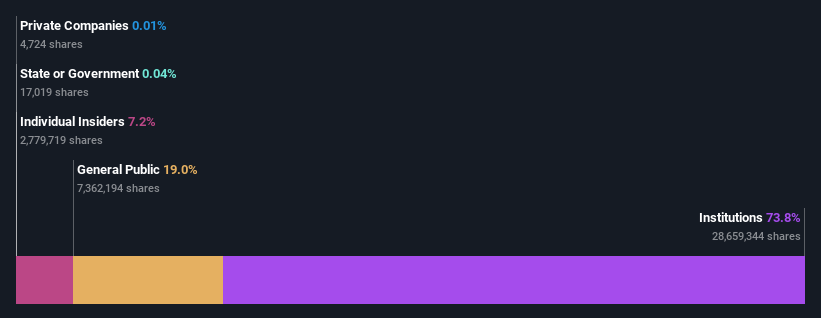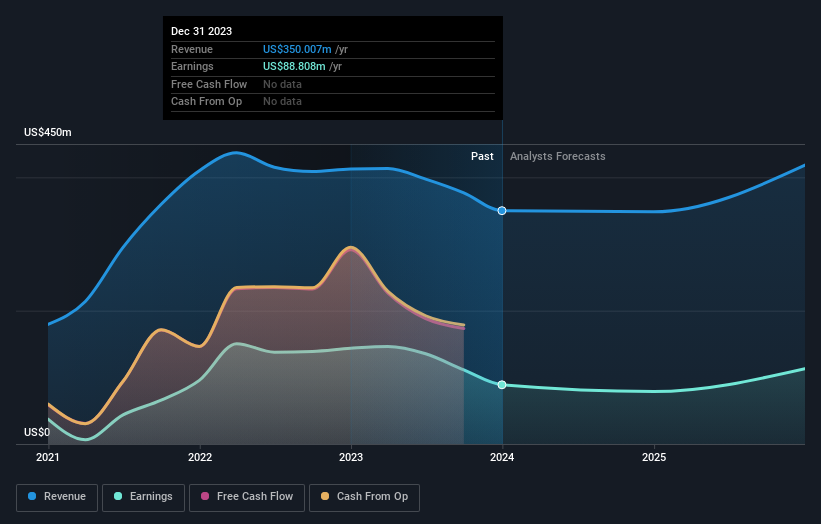- United States
- /
- Banks
- /
- NasdaqGS:DCOM
Institutional owners may consider drastic measures as Dime Community Bancshares, Inc.'s (NASDAQ:DCOM) recent US$154m drop adds to long-term losses

Key Insights
- Given the large stake in the stock by institutions, Dime Community Bancshares' stock price might be vulnerable to their trading decisions
- 50% of the business is held by the top 10 shareholders
- Insiders have sold recently
Every investor in Dime Community Bancshares, Inc. (NASDAQ:DCOM) should be aware of the most powerful shareholder groups. The group holding the most number of shares in the company, around 74% to be precise, is institutions. In other words, the group stands to gain the most (or lose the most) from their investment into the company.
And institutional investors endured the highest losses after the company's share price fell by 17% last week. The recent loss, which adds to a one-year loss of 37% for stockholders, may not sit well with this group of investors. Institutions or "liquidity providers" control large sums of money and therefore, these types of investors usually have a lot of influence over stock price movements. As a result, if the decline continues, institutional investors may be pressured to sell Dime Community Bancshares which might hurt individual investors.
In the chart below, we zoom in on the different ownership groups of Dime Community Bancshares.
View our latest analysis for Dime Community Bancshares

What Does The Institutional Ownership Tell Us About Dime Community Bancshares?
Institutions typically measure themselves against a benchmark when reporting to their own investors, so they often become more enthusiastic about a stock once it's included in a major index. We would expect most companies to have some institutions on the register, especially if they are growing.
Dime Community Bancshares already has institutions on the share registry. Indeed, they own a respectable stake in the company. This suggests some credibility amongst professional investors. But we can't rely on that fact alone since institutions make bad investments sometimes, just like everyone does. If multiple institutions change their view on a stock at the same time, you could see the share price drop fast. It's therefore worth looking at Dime Community Bancshares' earnings history below. Of course, the future is what really matters.

Institutional investors own over 50% of the company, so together than can probably strongly influence board decisions. We note that hedge funds don't have a meaningful investment in Dime Community Bancshares. BlackRock, Inc. is currently the largest shareholder, with 15% of shares outstanding. In comparison, the second and third largest shareholders hold about 7.3% and 6.1% of the stock. In addition, we found that Stuart Lubow, the CEO has 0.6% of the shares allocated to their name.
We also observed that the top 10 shareholders account for more than half of the share register, with a few smaller shareholders to balance the interests of the larger ones to a certain extent.
While it makes sense to study institutional ownership data for a company, it also makes sense to study analyst sentiments to know which way the wind is blowing. Quite a few analysts cover the stock, so you could look into forecast growth quite easily.
Insider Ownership Of Dime Community Bancshares
While the precise definition of an insider can be subjective, almost everyone considers board members to be insiders. Company management run the business, but the CEO will answer to the board, even if he or she is a member of it.
Insider ownership is positive when it signals leadership are thinking like the true owners of the company. However, high insider ownership can also give immense power to a small group within the company. This can be negative in some circumstances.
We can see that insiders own shares in Dime Community Bancshares, Inc.. In their own names, insiders own US$54m worth of stock in the US$758m company. Some would say this shows alignment of interests between shareholders and the board. But it might be worth checking if those insiders have been selling.
General Public Ownership
With a 19% ownership, the general public, mostly comprising of individual investors, have some degree of sway over Dime Community Bancshares. While this group can't necessarily call the shots, it can certainly have a real influence on how the company is run.
Next Steps:
I find it very interesting to look at who exactly owns a company. But to truly gain insight, we need to consider other information, too. Be aware that Dime Community Bancshares is showing 1 warning sign in our investment analysis , you should know about...
If you would prefer discover what analysts are predicting in terms of future growth, do not miss this free report on analyst forecasts.
NB: Figures in this article are calculated using data from the last twelve months, which refer to the 12-month period ending on the last date of the month the financial statement is dated. This may not be consistent with full year annual report figures.
New: Manage All Your Stock Portfolios in One Place
We've created the ultimate portfolio companion for stock investors, and it's free.
• Connect an unlimited number of Portfolios and see your total in one currency
• Be alerted to new Warning Signs or Risks via email or mobile
• Track the Fair Value of your stocks
Have feedback on this article? Concerned about the content? Get in touch with us directly. Alternatively, email editorial-team (at) simplywallst.com.
This article by Simply Wall St is general in nature. We provide commentary based on historical data and analyst forecasts only using an unbiased methodology and our articles are not intended to be financial advice. It does not constitute a recommendation to buy or sell any stock, and does not take account of your objectives, or your financial situation. We aim to bring you long-term focused analysis driven by fundamental data. Note that our analysis may not factor in the latest price-sensitive company announcements or qualitative material. Simply Wall St has no position in any stocks mentioned.
About NasdaqGS:DCOM
Dime Community Bancshares
Operates as the holding company for Dime Community Bank that engages in the provision of various commercial banking and financial services.
Flawless balance sheet with high growth potential and pays a dividend.


